Unit 7 Book 2 LS
(完整版)初中英语书单词汇总(初中全部)
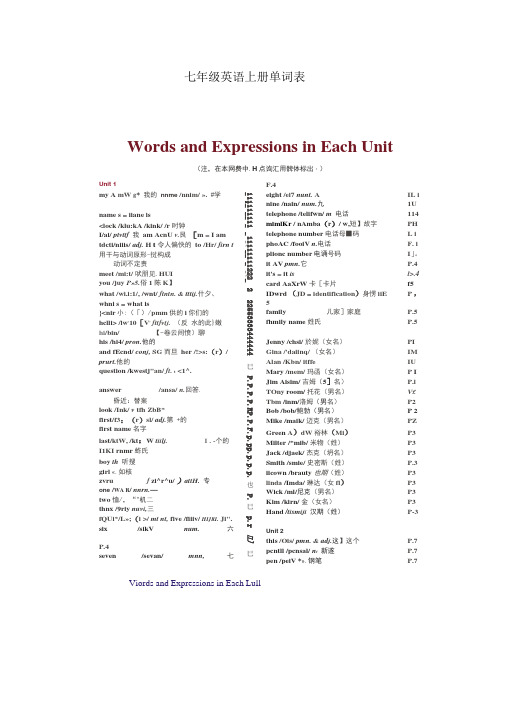
七年级英语上册单词表Words and Expressions in Each Unit(注,在本网费中.H 点询汇用髀体标出・)Unit 1my A mW g* 我的 nnme /nnim/ ». #学name s = iiane is<lock /klu:kA /kink/ /r 时钟I/ai/ ptvttf 我 am AcnU v.艮 [m = I amtdcti/niiis/ adj. H t 令人偏快的 to /Hr/ firn t 用干与动词原形-挝构成动词不定责meet /mi:t/ 吠朋见.HUI you /juy P»5.俗1 陈K 】what /wi.i:1/, /wnt/ ftntn. & tttij.什夕、 whni s = what is}<nir 小:(「)/pmm 供的i 你们的 hclli> /lw ,10[V , fttfvtj. (反 水的此}嫩 hi /bin/ 【-卷云间愤)聊 his /hi4/ pron.他的and fEcnd/ conj, SG 而旦 her /!>s:(r )/ prurt.他的question /kwestj"an/ ft. t <1^. answer/ansa/ n.回答.昏近:替案look /Ink/ v tfh ZbB*first /f3:(r )sl/ adj.第 +的 first name 名字last /ktW, /kt :W tiilj. I . -个的 I1KI rnmr 蚱氏 boy th 听搜 girl «.如核 zvru f zi^r^u/ )attH. 专 one /WA R / nnrn.— two 恤/,“"机二 thnx /9riy nuvi,三 fQUi*/L»;(i >/ mt nt, five /fiiiv/ HIJRI . Ji". six /sikV num.六P.4 seven/sevan/mnn,七F.4eight /ei7 nunt. A IL i nine /nain/ num.九1U telephone /telifwn/ m 电话114 mimlKr / nAmba (r )/ w,短】故字 PH telephone number 电话母■码 L i phoAC /fooiV n.电话 F. i plionc number 电诵号码 I 」。
Module 7 Unit 2 It's warm today(课件)

It’s sunny today. It’s windy today. It’s snowing today. It’s raining today.
Part 1(必做) Part 2(选做)
熟记本节课所学的句型、 短语和单词,必须会听、说、
读、写。
用本课句型为爸爸妈妈描述一下今 天的天气状况。
2.What can you do in Harbin? We can go swimming.
What’s the weather like?
rain
雨,下雨
very 很,非常
and 表示并列关系, but 表示转折关系。
snow
rain
sunny
windy
play
very
snow
雪,下雪
rain
雨,下雨
sunny 晴朗的,阳光充足的
windy 有风的,刮风的
It’s + 天气情况 + in + 季节
We ____+in + 季节
It’s ____today, but it’s ____.
It’s ____ and ____today.
play very
玩,玩耍 很,非常
.
How is the weather?
It’s cool .
凉爽的
It’s
.It’s in
.
We
in
.
How is the weather?
It’s snowing . snow 下雪
It’s winter.
-15 ~ -25 ℃
What’s the weather like in Harbin? What’s the weather like in Sanya? What can you do in Harbin? What can you do in Sanya?
人教版七年级英语上册Unit7-第二课时教学课件
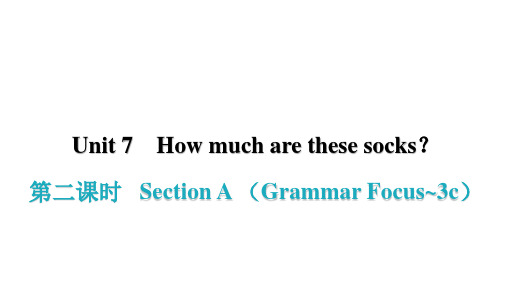
boys,” says Mrs. Hill. “Everything is cheap there.”
( B )16. A. gets
B. get
C. to get
( A )17. A. don't B. aren't C. isn't
( B )18. A. mine
B. my
C. me
“We know,” say the boys, “____19____ we go
课堂小测 一、用所给单词的适当形式填空 1. How much ___is_____ (be) this sweater? 2. My mother's hat is nine _d_o_l_l_a_rs__ (dollar). 3. Do you like these yellow __s_k_i_rt_s__ (skirt)? 4. Her shirt __l_o_o_k_s__ (look) very nice. 5. Look! My __s_h_o_e_s__ (shoe) are under my bed.
基数词的用法
表示数量多少的数词叫作基数词,如one, two, three等。
1. 基数词的拼写
1~9的基数词 11~19的基数词
one
eleven
two
twelve
three
thirteen
整十的基数词 ten
twenty thirty
两位数的基数词 twenty-one twenty-two thirty-three
( A )12. A. Why
B. How
C. When
( A )13. A. are
B. am
仁爱版七年级英语下册单词表完整版

仁爱版七年级英语下册单词表集团标准化办公室:[VV986T-J682P28-JP266L8-68PNN]仁爱版七年级英语下册单词表Unit5Topic1 gate[ɡet]n.大门by[ba]prep.(表示方式,如乘车等);按照adv.经过subway['sbwe]n.地铁=underground[nd'ɡrand]bysubway乘地铁always[':lwez]adv.总是,一直comeon快点儿;加油;来吧onfoot步行plane[plen]n.飞机train[tren]n.火车;v.培训,训练ship[p]n.(大)船,轮船,舰boat[bt]n.小船,舟weekday[wi:kde]n.工作日early[':l]adj.早的;提早的adv.早地;提早bird[b:d]n.鸟catch[kt]v.捉住;接住;染上(疾病)worm[w:m]n.软体虫,蠕虫(尤指蚯蚓)sometimes[smtamz]adv.有时seldom['seldm]adv.很少walk[w:k]v.&n.步行;散步never['nev(r)]adv.从不ride[rad]v.骑(自行车、马等)park[pɑ:k]n.公园;v.停(汽)watch[wt]v.观看;当心;n.手表television[telvn]n.电视;电视机=TVwatchTV看电视soccer[sk(r)](footballBrE)n.足球(运动)movie[mu:vi]n.电影filmbegin[b'ɡn]v.开始atschool 在学校;在上课after[mu:viprep.在…后conj.在…以后bed[bed]n.床basketball[bɑ:sktb:l]n.篮球swim[swm]v.&n.游泳goswimming去游泳listen['lsn]v.(注意地)听music['mju:zk]n.音乐;乐曲library['labrr]n.图书馆,图书室week[wi:k]n.星期,周once[wns]adv.一次;曾经conj.一旦twice[twas]adv.两次;两倍great[gret]adj.伟大的;好极的wall[gret]n.墙theGreatWall 长城life[laf]n.生活;生命American[merkn]adj.美国的n.美国人or[:(r)]conj.或者;否则over[v(r)]adv.结束;穿过;多于prep.在…上面more[m:(r)]det.更多的;adv.更多(much或many的比较级)talk[t:k]nv.&n.谈话Unit5Topic2make[mek]v.做,制造;使成为card[kɑ:d]n.卡片;贺卡boring['b:r]adj.没趣的,无聊的soon[su:n]adv.很快,马上classroom[klɑ:sru:m]n.教室playground['pleɡrand]n.操场lab[lb]n.实验室=laboratorycomputer[kmpju:t(r)]n.计算机;电脑room[ru:m]n.房间;空间hall[h:l]n.大厅,礼堂dininghall餐厅;食堂gym[dm]n.体育馆,健身房=gymnasiumn.建筑物,楼房swimming[swm]n.游泳pool[pu:l]n.水池,水塘clean[kli:n]v.使…干净;adj.干净的dosomecleaning 打扫run[rn]v.跑,奔跑dance[dɑ:ns]v.&n.跳舞borrow['br]v.借,借用workbook[w:kbk]n.练习册course[k(r)s]n.过程;课程ofcourse当然use[ju:s]V.用,使用n.用,使用lookfor寻找shelf[elf](pl.shelves)n.架子keep[ki:p]v.保存;保持must[mst]modalv.必须return[r't:n]v.归还;回来ontime准时,按时newspaper[nju:zpep(r)]n.报纸LostandFound失物招领处money['mn]n.钱wallet[wɑ:l t]around['rand]adv&rep.到处;围绕few[fju:]adj.很少,不多pron.很少人(或事物、地方)afew一些game[gem] n.比赛;运动;游戏sit[st](过去式sat)v.坐ping-pong n.乒乓球运动lesson[lesn]n.课write[rat]v.写aha[ɑ:'hɑ:]interj.啊哈blackboard[bl?kb:d]n.黑板atthebackof在……的后面draw[dr:]v.绘画;抽签n.抽签,抽奖picture['pkt(r)]n.照片;图片;画片because[b'kz]conj.因为Japanese[dp'ni:z]adj.日本的;日本人的;日语的;n.日语;日本人wonderful[wndfl]adj.了不起的;美妙的also[':ls]adv.也,而且Unit5Topic3Wednesday[wenzde]n.星期三Monday[mndi]n.星期一Tuesday[tju:zde]n.星期二Friday[frade]n.星期五physics[fzks]n.物理(学)geography[d'ɡrf]n.地理(学)P.En.体育.(physicaleducatin的缩写)art[ɑ:t]n.美术,艺术history[hstri]n.历史math[mθ]n.数学=mathematicsbiology[baldi]n.生物(学)politics[pltks]n.政治science['sans]n.科学meeting[mi:t]n.会议;会面easy['i:z]adj.容易的interesting[ntrst]adj.有趣的difficult['dfklt]adj.难的learn[l:n]v.学习,学会which[wt]det&pron.哪一个;哪一些subject['sbdkt]n.学科;主题best[best]adv.&adj.最好地(的)(good和well的最高级)study[stdi]v.学习;研究n.书房outdoor[atd:(r)]adj.户外的;室外的activity[k'tvt]n.活动between[btwi:n]prep.在(两者)之间;在……中间stamp[stmp]n.邮票v.跺脚Saturday[s?tde]n.星期六from…to…从…到…night[nat]n.夜间sound[sand]n.声音v.听起来好像February[februri]n.(Feb.)二月hard[hɑ:d]adj.努力的;困难的adv.艰难地;努力地late[let]adv.晚,迟adj.迟(的),晚(的)Unit6Topic1beautiful['bju:tfl]adj.美丽的garden['ɡɑ:dn]n.花园bedroom[bedru:m]n.卧室second['seknd]num.&adv.第二floor[fl:(r)]n.楼层;地板andsoon等等upstairs[pstez]adv.在(或向)楼上kitchen['ktn]n.厨房diningroom[danru:m]餐厅livingroom[bathroom[bɑ:θru:m]n.浴室,洗手间first[f:stnum.&adv.第一lamp[lmp]n.灯clock[klk]n.钟near[n(r)]prep.在…附近adv.在附近aaj.近的under[nd(r)]prep在…下面;少于chair[te(r)]n.椅子behind[bhand]prep.(表示位置)在……后面front[frnt]n.前面;前部adj.前面的;前部的infrontof在……前面guitar[ɡtɑr]n.吉他window[windu]n.窗户table['tebl]n.桌子;表格key[ki:]n.钥匙;关键put[pt]v.放away['we]adv.离开putaway将……收起door[d:(r)]n.门lookafter 照顾thing[θ]n.东西;事情inthecenterof在……中心yard[jɑ:d]n.院子flower['fla(r)]n.花house[has]n.房子,住宅large[lɑ:d]adj.大的,巨大的left[left]n.左,左边;adv.向左;adj.左边的model['mdl]n.模型;模特儿only[nli]adv.仅仅,只有adj.仅有的,唯一的Unit6Topic2townhouse['tanhaz]n.排房farmhouse[fɑ:mha s]n.农场住宅country[kntri]n.农村,国家apartment[pɑ:tm nt]n.(美)公寓套房rent[rent]v.租借;出租quiet['kwat]adj.安静的month[mnθ]n.月,月份forrent 出租neighbor['neb]n.邻居store[st:(r)]n.(大型)百货商店bank[bk]n.银行;岸corner['k:n(r)]n.(街道)拐角;角post[pst]n.邮件;邮政v.邮寄postoffice[pustfis]n.邮局bookstore['bkst:(r)]n.(美)书店parkinglot[pɑ:k lt]停车场supermarket[sju:pmɑ:kit]n.超市railway[relwe]n.铁路station['sten]n.车站end[end]n.尽头;结尾v.结束road[rd]n.路,道路,公路suchas 例如community[k'mju:nt]n.社区child[tald](pl.children)n.儿童,小孩alotof许多,大量(=lotsof)sport[sp:t]n.体育运动close[kls]adj.接近;亲密的v.关,关闭closeto靠近far[fɑ:(r)]adj.远的adv.远farfrom远离service['s:vs]n.服务area['er]n.地区;面积colorful['klfl]adj.五彩缤纷的sleep[sli:p]v.&n.睡觉countryside[kntrisad]n.乡村,农村city['st]n.城市noisy['nz]adj.吵闹的traffic['trfk]n.交通cost[kst]n.费用,花费v.需付费miss[ms]v.思念;错过air[e(r)]n.空气;空中fresh[fre]adj.新鲜的Unit6Topic3along[l]prep.沿着,顺着adv.(与某人)一道,一起turn[t:n]v.转弯;(使)变成n.转弯;轮流crossing[krs]n.十字路口meter['mi:t(r)]n.米,公尺across[t:n]prep.横过;在…对面acrossfrom在对面bridge[brd]n.桥until[ntl]conj.&prep.直到…为止kilometer['klmi:t]n.千米,公里should[d]modalv.应该(shall的过去式) change[tend]v.更换;改变;n.找给的零钱;stop[stp]n.车站v.停止;阻止public['pblk]adj.公共的,公众的n.公众;公开light[lat]n.灯;灯光adj.明亮的;浅色的;轻的crosswalk[krsw:k]n.人行横道danger[dend(r)]n.危险safe[sef]adj.安全的hurt[h:t]adj.(身体上)受伤的;v.受伤;感到疼痛lose[lu:z]v.失去;丢失;输掉accident['ksdnt]n.事故obey['be]v.服从rule[rul]n.规则cross[krs]v.穿过sign[san]n.指示牌;符号before[bf:(r)]conj.在…以前prep.在…以前;在…前面adv.以前both[bθ]pron.两个,两个都third[θ:d]num.第三last[lɑ:st]adv.最后;最近det.最近的;最后的v.持续careful['kefl]adj.小心的ticket['tkt]n.罚款单;票speed[spi:d]v.超速行驶n.速度wrong[r]adj.错误的;有问题的place[ples]n.地点,地方fast[fɑ:st]adv.快,迅速adj.快的,迅速的down[dan]prep沿着;向下adv.向下hill[hl]n.小山,山丘rest[rest]n.休息;其余story[st:ri]n.故事,小说Unit7Topic1writer[rat]n.作家,作者novel[nvl]n.(长篇)小说was[wz]v.(am,is的过去式)是born[b:n]v.出生fan[fn]n.迷;风扇January[dnjuri]n.(Jan.)一月March[mɑ:t]n.(Mar.)三月April['eprl]n.(Apr.)四月May[me]n.五月June[du:n]n.(Jun.)六月July[dula]n.(Jul.)七月August[:gst]n.(Aug.)八月September[septemb(r)]n.(Sept.)九月October[ktb(r)]n.(Oct.)十月November[nvemb(r)]n.(Nov.)十一月December[dsemb(r)]n.(Dec.)十二月were[w:(r)]v.(are的过去式)是thousand[θaznd]num.千birthday[b:θde]n.生日date[det]n.日期;约会calendar[k?lnd(r)]n.日历plan[pln]v.&n.计划,打算celebrate['selbret]v.庆祝party['pɑ:t]n.聚会,宴会;党派fourth[f:θ,frθ]num.第四fif th[ffθ]num.第五sixth[sksθ]num.第六seventh['sevnθ]num.第七eighth[etθ]num.第八ninth[nanθ]num.第九tenth[tenθ]num.第十eleventh['levnθ]num.第十一twelfth[twelfθ]num.第十二twentieth['twentθ]num.第二十present['preznt]n.礼物shape[ep]n.形状v.使成为…形状ball[b:l]n.球;舞会afraid[fred]adj.担心;害怕star[stɑ:(r)]n.星;明星mouse[mas]n.老鼠square[skwe(r)]n.正方形;广场;平方adj.正方形的circle['s:kl]n.圈,圆圈v.圈出triangle['traɡl]n.三角形。
Unit7Task课件牛津译林版英语七年级上册2

books.
All the restaurants are on the
. There are foods from different
_______. I like Chongqing Restaurant. The food there is really great.
I like watching films, so the big ________ is my favourite place in the
mall.
The mall is a good place to meet friends and have fun.
Sunshine Shopping Mall is a new mall. It is near _a__b_u_s_s_to_p___. The mall is very big. There are __f_iv__e__ floors of shops and each floor is big. There are many _c_l_o_th_e_s__sh_o_p_s_. We can get ___d_if_fe_r_e_n_t_ kinds of clothes here. There is also a big _b_o_o_k_sh_o_p_. It has lots of interesting books. All the restaurants are on the top floor . There are foods from different __a_re_a_s__. I like Chongqing Restaurant. The food there is really great. I like watching films, so the big _c_i_n_e_m_a__ is my favourite place in the mall. The mall is a good place to meet friends and have fun.
新视野大学英语第三版视听说教程BOOK2-UNIT7-Weird, wild and wonderful

Listening to the world
WHILE you listen
4 Listen to Part 2 and use numbers, symbols and abbreviations to complete the outline.
Topic: The planet is in trouble: 1) ______3______ most important 2) ___p_r_o_b_s._____
1 Work in pairs and do the nature quiz.
5 Which river is longer? a a The Nile ( 尼罗河). b The Amazon ( 亚马孙河).
6 Which is the highest waterfall in
the world? a a Angel Falls ( 安赫尔瀑布). b Niagara Falls ( 尼亚加拉瀑布).
be treated as so – should be treated with respect.
__B__ 6 Er, since I was a little girl, I’ve always really liked
foxes for some reason.
Listening to the world
Listening to the world
After you listen
Listening to the world
Sharing Listening Viewing
Listening to the world
1 Watch a podcast for its general idea.
七年级基础英语单词

基础:名词:sister /'sistə/ n. 姐;妹brother /'brʌðə/ n. 兄;弟son /sʌn/ n. 儿子mom /mɔm/, /ma:m/ n. (=mum)妈妈dad /dæd/ n. 爸爸photo /'fəutəu/ n. 照片picture /'piktʃə/ n. 照片;图画girl /gə:l/ n. 女孩dog /dɔg/ n. 狗pencil /'pensl/ n. 铅笔book /buk/ n. 书box /bɒks/ n. 箱;盒pencil box 铅笔盒;文具盒schoolbag /'sku:lbæg/ n. 书包game /geim/ n. 游戏;运动;比赛card /kɑ:d/ n. 卡片ID card 学生卡;身份证ring /riŋ/ n. 戒指bag /bæg/ n. 袋;包e-mail /'emeil/ n. (=email)电子邮件set /set/ n. 一套;一副;一组a set of 一套;一副;一组动词:have /hæv/ v. 经受;经历Have a good day! (表示祝愿)过得愉快!thank /θæŋk/ v. 感谢;谢谢help /help/ v.&n. 帮助;援助ask /ɑ:sk/ v. 请求;要求;询问ask... for... 请求;恳求(给予)call /kɔ:l/ v. (给......)打电话代词:me /mi:/ pron. (I的宾格)我who /hu:/ pron. 谁;什么人they /ðei/ pron. 他(她、它)们his /hiz/ pron. 他的介词:of /ɔv, əv/ prep. 属于(人或物);关于(人或物)for /fɔ:/ prep. 为了;给;对in /in/ prep. 在......里at /æt/ prep. 按照;根据;在(某处、某时间时刻)形容词:here /hiə/ adv. (用以介绍人或物)这就是;在这里next /nekst/ adj.&n. 下一个(的);接下来(的)some /sʌm/ adj. 一些;某些感叹词:oh /əu/ interj. 哦;啊bye /bai/ interj. (=goodbye)再见Unit41、基础词1、基础do [du:, du] aux v./v.做;干have [hæv, həv]v.有has [hæz,həz]v.(have的第三人称单数形式)有let [let]v.允许;让go [gəu] v.去;走get [get]v.去取(或带来);得到love [lʌv]v.n.爱;喜欢hey [hei]interj.嘿;喂us [ʌs, əs]pron.我们we [wi:]pron.我们them [ðem,ðəm]pron.(宾格)他(她,它)们TV ['ti:'vi:]n.电视;电视机Bill [bil]比尔(男名)ball [bɔ:l]n.球ping-pong乒乓球soccer ['sɔkə] n.(英式)足球basketball ['bɑ:skitbɔ:l]n.篮球sport [spɔ:t]n.体育运动class [klɑ:s]n.班级;课classmate ['klɑ:smeit] n.同学only ['əunli]adv.只;仅fun [fʌn]adj.有趣的;使人快乐的n.乐趣;快乐easy ['i:zi]adj.容易的;不费力的great [greit]adj.美妙的;伟大的n. 五月party/'pa: (r)ti/ n. 聚会;晚会test /test/ n. 测验;检查trip /trip/ n. 旅游;旅行art /a: (r)t/ n. 艺术;美术thing /θiŋ/ n. 东西;事情term/tə: (r)m/ n. 学期time/taim/ n. 时间P.E. /pi: 'i:/ n.(=physical education)体育Music/'mju:zik/ n. 音乐;乐曲math/mæθ/n. 数学Sunday/'sʌndei/ n. 星期日/'hæpi/adj. 愉快的;高兴的old /əuld/adj. 年老的;旧的dear/diə(r)/,/dir/adj. 亲爱的busy/'bizi/adj. 忙碌的;无暇的free /fri:/adj. 空闲的cool /ku:l/adj. 妙极的;酷的/wen/adv. (疑问副词)什么时候why /wai/adv. 为什么there /ðeə(r)/ ,/ðer/adv. (在)那里/fə: (r)st/num. 第一Third/θə: (r)d/num. 第三fifth /fifθ/num. 第五ninth/nainθ/num. 第九/frɔm/,/fra:m/prep (表示开始的时间)从......开始birthday!生日快乐!How old...?....多大年纪?..几岁了?See you!再见!from... to...从......到......Unit 3 How do you get to school 基础Unit 4 Don’t eat in class . 基础。
人教版初中英语七年级上册单词(手机版)

col·or col·our starter Unit 3 - 01
rceodlor ['kʌlə(r)] n.(= colour) 颜色 yreedl·l[orewd] adj.&n.红色(的) gyerelleonw ['jeləʊ] adj.&n.黄色(的) bglrueen [gri:n] adj.&n.绿色(的) blaucek[blu:] adj.&n.蓝色(的) wblhaictke [blæ k] adj.&n.黑色(的) pwuhri·tpel[ewait] adj.&n.白色(的) bpruorwplne ['pɜ:(r)pl] adj.&n.紫色(的) tbhreown [braʊn] adj.&n.棕色(的);褐色(的) the [ði; ðə] art.指已提到或易领会到的人或事物
hie[lh·laoӀ] interj.(用于打招呼)嗨;喂
ahfe·ltleor·[hnəo'ləoun] interj.你好;喂
Gafoteordnoaof·nte[rֽ·an:fotəo'nnu:n],[ֽæ:ftə'nu:n] n.下午
eGvoeo·ndianfgternoon! 下午好!
Gevoeondinegve['i·:vnniӀŋn]gn.晚上;傍晚
tfihnaen[kfasӀn] adj.健康的;美好的
OthKanks [θæŋks] interj.&n.感谢;谢谢
HOBK [əʊ'keӀ] interj.&adv.好;可以
CHDB [ֽeӀtʃ'bi:] (铅笔芯)硬黑
CD [ֽsi:' di:] 光盘;激光唱片
【单词】Unit+1+单词小测单+2024-2025学年仁爱版英语七年级上册

序号单词中文序号单词中文1 hello 32 ID2 nice 33 card3 to 34 number4 meet 35 eleven5 you 36 twelve6 too 37 thirteen7 good 38 fourteen8 morning 39 fifteen9 I 40 sixteen10 fine 41 seventeen11 how 42 eighteen12 do 43 nineteen13 am 44 twenty14 like 45 hi15 play 46 this16 basketball 47 where17 my 48 are18 name 49 from19 read 50 and20 love 51 in21 hiking 52 class22 enjoy 53 grade23 football 54 which24 sing 55 we25 miss 56 classmate26 what 57 year27 your 58 old28 please 59 see29 hobby 60 around30 dancing 61 city31 student 62 age序号中文单词序号中文单词1 你好32 身份2 友好的33 卡片3 到34 数字4 见面35 十一5 你36 十二6 也37 十三7 好的38 十四8 早晨39 十五9 我40 十六10 好的41 十七11 怎么样42 十八12 做43 十九13 是44 二十14 喜欢45 嗨15 玩46 这个16 篮球47 在哪里17 我的48 是18 名字49 从19 阅读50 和20 爱51 在...里面21 徒步旅行52 班级22 享受53 年级23 足球54 哪一个24 唱歌55 我们25 想念56 同班同学26 什么57 年27 你的58 老的28 请59 看见29 爱好60 周围30 跳舞61 城市31 学生62 年龄序号音标单词中文序号单词单词中文1 /həˈloʊ/ 32 /aɪˈdiː/2 /naɪs/ 33 /kɑːrd/3 /tuː/34 /ˈnʌmbər/4 /miːt/35 /ɪˈlevn/5 /juː/36 /twɜːlv/6 /tuː/37 /θɜːrtiːn/7 /ɡʊd/38 /ˈfɔːrtiːn/8 /ˈmɔːrnɪŋ/39 /ˈfɪftiːn/9 /aɪ/ 40 /ˌsɪksˈtiːn/10 /faɪn/ 41 /ˌsevnˈtiːn/11 /haʊ/ 42 /ˈeɪtʃˌtiːn/12 /duː/43 /naɪnˈtiːn/13 /æm/ 44 /ˈtwɛnti/14 /laɪk/ 45 /haɪ/15 /pleɪ/ 46 /ðɪs/16 /ˈbɑːskɪtbɔːl/47 /weər/17 /maɪ/ 48 /ɑːr/18 /neɪm/ 49 /frʌm/19 /riːd/50 /ænd/20 /lʌv/ 51 /ɪn/21 /ˈhaɪkɪŋ/52 /klæs/22 /ɪnˈdʒɔɪ/ 53 /ɡreɪd/23 /ˈfʊtbɔːl/54 /wɪtʃ/24 /sɪŋ/55 /wiː/25 /mɪs/ 56 /ˈklæsmeɪt/26 /wɒt/ 57 /jɪr/27 /jɔːr/58 /oʊld/28 /pliːz/59 /siː/29 /ˈhɒbi/ 60 /əˈraʊnd/30 /ˈdænsɪŋ/61 /ˈsɪti/31 /ˈstjuːdnt/62 /eɪdʒ/序号单词中文序号单词中文1 tall 27she2 friendly 28six3 China 29seven4 slim 30guitar5 kind 31quiet6 draw 32all7 picture 33new8 look 34very9 short 35happy10 strong 36at11 thin 37school12 personality 38music13 run 39same14 cook 40they15 need 41it16 can 42cute17 be friend 43dog18 younger 44cat19 together 45one20 help 46both21 each 47listen22 other 48America23 he 49lovely24 Canada 50has25 often 51brother26 best 52country序号中文单词序号中文单词1 高的27她2 友善的,28六3 中国29七4 苗条的30吉他5 温和的,31安静的6 绘画32所有的7 图画,照33新的8 看,看起34非常9 短的,矮35快乐的10 强壮的36在11 瘦的37学校12 个性,性38音乐13 跑,经营39相同的14 烹饪40他们15 需要41它16 能够42可爱的17 朋友43狗18 更年轻的44猫19 一起45一20 帮助46两者都21 每一个47听22 其他的48美国23 他49可爱的24 加拿大50有25 经常51兄弟26 最好的52国家序号音标单词中文序号单词单词中文1 /tɔːl/27/ʃi:/2 /ˈfrendli/28/sɪks/3 /ˈtʃaɪnə/ 29/ˈsevn/4 /slɪm/ 30/ɡɪˈtaː(r)/5 /kaɪnd/ 31/ˈkwaɪət/6 /drɔː/32/ɔːl/7 /ˈpɪktʃə(r)/ 33/nu:/8 /lʊk/ 34/ˈveri/9 /ʃɔːrt/35/ˈhæpi/10 /strɒŋ/36/æt/11 /θɪn/ 37/skuːl/12 /ˌpɜːrsəˈnæləti/ 38/ˈmjuːzɪk/13 /rʌn/ 39/seɪm/14 /kʊk/ 40/ðeɪ/15 /niːd/41/ɪt/16 /kæn/ 42/kjuːt/17 /biː frɛnd/ 43/dɒɡ/18 /ˈjʌŋgər/ 44/kæt/19 /təˈgeðə(r)/ 45/wʌn/20 /help/ 46/bəʊθ/21 /iːtʃ/ 47/ˈlɪsn/22 /ˈʌðə(r)/ 48/əˈmerɪkə/23 /hi:/ 49/ˈlʌvlɪ/24 /kænədə/ 50/hæz/25 /ˈɒfn/ 51/ˈbrʌðə(r)/26 /best/ 52/ˈkʌntrɪ/序单词中文序号中文单词号1 girl 1 女孩2 everyone 2 每个人3 introduce 3 介绍4 myself 4 我自己5 with 5 和,具有6 beautiful 6 美丽的7 book 7 书8 also 8 也9 thing 9 事物10 such 10 如此的11 great 11 极好的12 time 12 时间13 her 13 她的14 talk 14 讲话15 others 15 其他人16 really 16 真正地17 different 17 不同的Developing&wrapping up the Topic看音标写单词序号音标单词中文1 /ɡɜːl/2 /ˈevriwʌn/3 /ˌɪntrəˈdjuːs/4 /maɪself/5 /wɪð/6 /ˈbjuːtɪfl/7 /bʊk/8 /ˈɔːlsəu/9 /θɪŋ/10 /sʌtʃ/11 /greɪt/12 /taɪm/13 /hɜː(r)/14 /tɔːk/15 /ˈʌðə(r)s/16 /ˈriːəli/17 /ˈdɪf(ə)r(ə)nt/。
译林版英语七年级下册Unit7Task
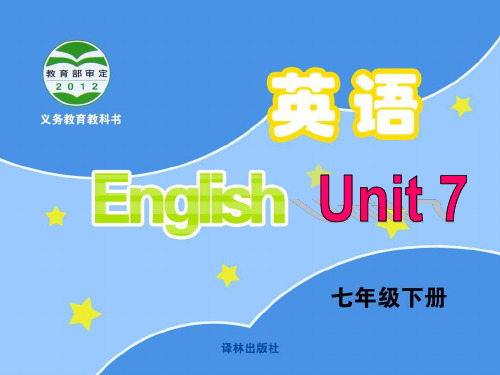
② Ability ③ Personality ④ What he did
⑤Hope
Recommendation letter • Introduction 介绍
7. __W__h_a_t_ useful information it is! 8. _H__o_w_ delicious the fish is!
9. __W__h_a_t__ important news! 10. W__h__a_t _a_nimportant news article! 11.--_W__h__a_t _big fish you bought us! --I got them at the market.
Do you know this TV programme?
It shows the most touching(感人的) people in China.
We recommended them to this show.
recommend them to be /as the most Touching People in China
like collecting clothes and books
for children in nleoesde. one’s way 迷路
Last week, a 5-year-old boy _lo_s_t_h_i_s_w__a_y (迷路) and cried in the street…
3. kind
outdoor activities. She says she needs to care for the students in need.n. 短缺,缺乏
关心,在乎
有需要的
I think we can recommend her for the Most
鲁教版七年级上册英语知识点
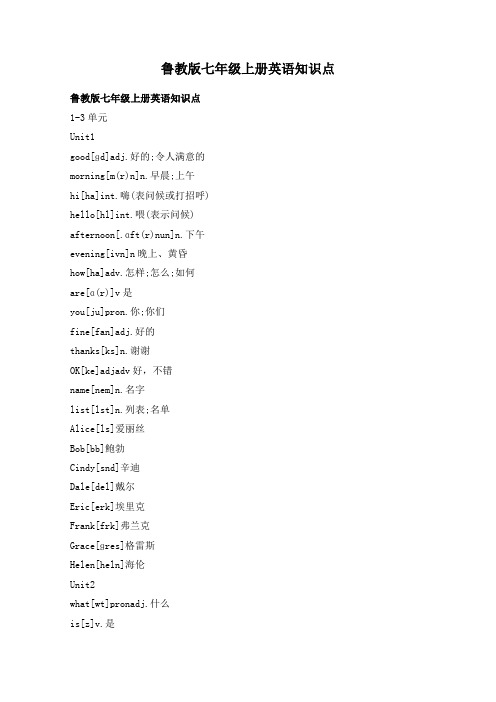
鲁教版七年级上册英语知识点鲁教版七年级上册英语知识点1-3单元Unit1good[ɡd]adj.好的;令人满意的morning[m(r)n]n.早晨;上午hi[ha]int.嗨(表问候或打招呼)hello[hl]int.喂(表示问候)afternoon[.ɑft(r)nun]n.下午evening[ivn]n晚上、黄昏how[ha]adv.怎样;怎么;如何are[ɑ(r)]v是you[ju]pron.你;你们fine[fan]adj.好的thanks[ks]n.谢谢OK[ke]adjadv好,不错name[nem]n.名字list[lst]n.列表;名单Alice[ls]爱丽丝Bob[bb]鲍勃Cindy[snd]辛迪Dale[del]戴尔Eric[erk]埃里克Frank[frk]弗兰克Grace[ɡres]格雷斯Helen[heln]海伦Unit2what[wt]pronadj.什么is[z]v.是this[s]pron.adj.这;这个in[n]prep.用(表方法、媒介、工具等) English[ɡl]n.英语it[t]pron.它a[,e]art.(辅音音素前)一个(把,台) an[n](元音音素前)一个(把,台)map[mp]n.地图orange[rnd]n.橘子、橙子jacket[dkt]n.夹克衫key[ki]n.钥匙quilt[kwlt]n.被子pen[pen]n.钢笔ruler[rulr]n.直尺spell[spel]v.拼写;拼字please[pliz]v.请Unit3color[kl(r)]n.色;颜色red[red]adj.n.红色(的)yellow[jel]adj.n.黄色(的)green[ɡrin]adj.n.绿色(的)blue[blu]adj.n.蓝色(的)black[blk]adj.n.黑色(的)white[wat]adj.n.白色(的)and[nd]conj.和;又;而且the[i][]art.表特指的人、物或群体鲁教版七年级上册英语单词表4-6单元 Unit4my[ma]pron.我的clock[klk]n.时钟nice[nas]adj.好的;令人愉快的meet[mit]v.遇见;相逢your[j(r)]pron.你的;你们的his[hz]pron他的her[h(r)]pron她的question[kwestn]n.问题;难题;询问 answer[ɑns(r)]n.回答;答复;答案 look[lk]v.看;望;看起来first[f(r)st]num.第一last[lɑst]adj最后的;上一个的boy[b]n.男孩girl[ɡ(r)l]n.女孩zero[zir]numn.零one[wn]num.一two[tu]num.二three[ri]num.三four[f(r)]num.四five[fav]num.五six[sks]num.六seven[sevn]num.七eight[et]num.八nine[nan]num.九telephone[telfn]n.电话number[nmb(r)]n.数;数字card[kɑ(r)d]n.卡;卡片;纸牌family[fmli]n.家;家庭unit5pencil[pensl]n.铅笔book[bk]n.书eraser[rez]n.橡皮case[kes]n.盒;箱;橱backpack[bkpk]n.双肩背包pencilsharpener[penslɑ(r)pn(r)]铅笔刀;卷笔刀dictionary[dknr]n.字典that[t]pron.那个yes[jes]adv.是No[n]adv.不;不是not[nt]adv.(构成否定句)不是excuse[kskjuz]v.原谅;宽恕thank[k]v.感谢OK[ke]interj.好的do:[du]v.aux做;干;构成疑问句和否定句的助动词 baseball[besbl]n.棒球watch[wt]n.手表computer[kmpjut(r)]n.电脑,电子计算机game[ɡem]n.运动;游戏notebook[ntbk]n.笔记本ring[r]n.戒指;环状物call[kl]v.打电话at[t]prep.在里面;在(点、刻);以in[n]prep.在..里面lost[lst]v.遗失found[fand]v.找回school[skul]n.学校set[set]n.(一)套of[v]prep.(属于)的Unit6sister[sst(r)]n.姐;妹motherm(r)]n.妈妈;母亲father[fɑ(r)]n.爸爸;父亲parent[pernt]n.父亲或母亲brother[br(r)]n.兄;弟grandfather[ɡrndfɑ(r)]n.祖父;外祖父grandmother[ɡrndm(r)]n.祖母;外祖母friend[frend]n.朋友grandparent[ɡrndpernt]n.祖父母;外祖父母 those[z]pron.那些these[i:z]pron.这些she[i:]pron.她he[hi:]pron.他aunt[ɑnt]n.姨母;姑母;伯母;舅母son[sn]n.儿子cousin[kzn]n.堂(表)兄弟;堂(表)姐妹daughter[dt(r)]n.女儿uncle[kl]n.叔;伯;舅;姨父;姑父picture[pkt(r)]n.照片;图画dear[d]n.亲爱的for[f(r)]prep.为了photo[ft]n.照片;here[h]adv.这里Dave[dev]n.戴维Anna[n]n.安娜Paul[pl]n.保罗Emma[em]n.埃玛Mona[mn]n.莫娜鲁教版七年级上册英语单词表7-10单元Unit7where[we]adv.在哪里table[tebl]n.桌子bed[bed]n.床dresser[dres(r)]n.梳妆台 bookcase[bkkes]n.书橱sofa[sf]n.沙发chair[te]n.椅子drawer[dr(r)]n.抽屉plant[plɑnt]n.植物under[nd(r)]prep.在之下 they[e]pron.他们on[n]prepl在上know[n]v.知道;了解bag[bɡ]n.书包;提包math[m]n.数学alarm[lɑ(r)m]clock闹钟 video[vd]n.录像;视频tape[tep]n.录音带hat[ht]n.帽子take[tek]v.拿走;带到thing[]n.东西to[tu]prep.朝;向mom[mm]n.妈妈can[kn]v.能;会;可以bring[br]v.拿来;取来some[sm]pron.一些;若干 need[nid]v.需要floor[fl(r)]n.地板room[rum]n.房间TV[tivi]n.电视desk[desk]n.书桌Tommy[tm]n.汤米Sally[sl]n.萨莉unit8have[hv]v.有soccer[sk(r)]n.英式足球ball[bl]n.球tennis[tens]n.网球racket[rkt]n.(网球,羽毛球的)球拍tennisrackt[tens][rkt]网球拍volleyball[vlbl]n.排球basketball[bɑsktbl]n.篮球bat[bt]n.(乒乓球等的)球拍let[let]v.允许,让us[s]pron.我们(宾语)play[ple]v.玩,打球well[wel]interj.喔;噢;唔;这个(用来引出一句话,继续讲述或填补间歇) sound[sand]v.听起来sport[sp(r)t]n.运动we[wi]pron.我们many[men]adj.大量的club[klb]n.社团,俱乐部more[m(r)]pron.更多的,更大的class[klɑs]n.上课,(一节)课interesting[ntrst]adj.有趣的,令人感兴趣的boring[br]adj.无聊的,令人生厌的fun[fn]adj.(口)有趣的,令人愉快的difficult[dfklt]adj.困难的relaxing[rlks]adj.轻松的watch[wt]v.观看,注视has[hz]v.(have的第三人称单数)有great[ɡret]adj.美妙的,大方collection[klekn]n.收藏品,收集物but[bt]conj.但是only[nl]adv.只,仅仅them[m]pron.他们(宾语)every[evr]adj.每一,每个day[de]n.天,日间,白天,一日Unit9like[lak]v.喜欢banana[bnɑn]n.香蕉hamburger[hmb(r)ɡ(r)]n.汉堡包tomato[tmɑt]n.西红柿broccoli[brkl]n.花椰菜Frenchfries[frentfraz]扎马铃薯条;薯条ice[as]n.冰cream[krim]n.奶油;乳脂salad[sld]n.沙拉strawberry[strbr]n.草莓pear[pe]n.梨have[hv]v.吃;饮countable[kantb()l]noun[nan]可数名词uncountable[nkantb()l]noun[nan]不可数名词 food[fud]n.食物egg[eɡ]n.蛋;鸡蛋apple[pl]n.苹果carrot[krt]n.胡萝卜chicken[tkn]n.鸡;鸡肉breakfast[brekfst]n.早餐lunch[lnt]n.午餐dinner[dn(r)]n.正餐;晚餐fruit[frut]n.水果vegetable[vedtbl]n.蔬菜;植物runner[rn(r)]n.参加赛跑的人;奔跑者 eat[it]v.吃well[wel]adv.好;对;满意地run[rn]v.跑;奔跑star[stɑ(r)]n.星星lot[lt]n.许多;很多healthy[hel]adj.健康的;强健的dessert[dz(r)t]n.(饭后的)甜点unit10pants[pnts]n.裤子sock[sk]n.短袜shirt[(r)t]n.男衬衫T-shirt[ti:(r)t]n.T恤衫shorts[(r)ts]n.短裤sweater[swet(r)]n.毛衣shoe[u]n.鞋子skirt[sk(r)t]n.裙子sale[sel]n.出售dollar[dl]n.元big[bɡ]adj.大的,广的,重的small[sml]adj.小的,小号的short[(r)t]adj.短的,矮的long[l]adj.长的clerk[klɑk]n.职员,办事员help[help]v.帮助want[wnt]v.想要example[ɡzɑmpl]n.例子ten[ten]num.十eleven[levn]num.十一twelve[twelv]num.十二thirteen[(r)tin]num.十三fourteen[f(r)tin]num.十四fifteen[fftin]num.十五sixteen[skstin]num.十六seventeen[sevntin]num.十七eighteen[etin]num.十八nineteen[nainti:n]num.十九twenty[twent]num.二十thirty[(r)t]num.三十clothes[klz]n.衣服,服装store[st(r)]n.商店come[km]v.来到buy[ba]v.买very[ver]adv.很,非常price[pras]n.价格each[i:t]pron.每个anybody[enbd]pron.任何人afford[f(r)d]v.买得起our[a]pron.我们的see[si]v.看见yourself[j(r)self]pron.你自己反身代词 Mr[mst(r)]先生sell[sel]v.卖,售from[frm]prep.从...起sorry[sr]adj.抱歉,遗憾的,难过的Lisa[li:z]n.女名Reviewfurniture[f(r)nt(r)]n.家具总称people[pip()l]n.人,人民blank[blk]n.空白conversation[knvsen]n.交谈,谈话other[(r)]adj.其他的also[ls]adv.也,亦;并且Joe[d]乔鲁教版七年级上册英语学习方法1.Study Every Day坚持每天学习It's important to study English every day. However, don't exaggerate! Study for thirty minutes every day instead of two hours once a week. Short, steady practice is much better for learning than long periods on an irregular basis. This habit of studying English every day will help keep English in your brain fresh.每天都坚持学英语很重要。
全册单词听写课件 高中英语必修第二册

bill for your hotel room.
新外研 book2 unit2
单词听写
1. The President __h_o_n_o_re_d__表示敬意us with a personal visit. 2. Today is the seventh day of the seventh _lu_n_a_r__ 月球的month. 3. A _p_o_e_t__诗人who loves poetry writes poems in praise of _f_re_e_d_o_m__自由. 4. Farmers are extremely busy during the _h_a_r_v_e_s_t __收成.
1.An engine has many parts, each performing a dfiuffnecretinotn _________ 功能.
2.Could you _d_o_w_n__lo_a_d_下载 some music for me? 3.These problems are closely r_e_l_a_te_d___相关的. 4.She‘s on a very strict __d_ie_t_日常饮食. 5.People who are drug __a_d_d_ic_t_s__瘾君子 come in and steal. 6.Here‘s a _t_ip__建议I picked up from my mother. 7.It is the _c_u_s_t_o_m_ 风俗in that country for women to marry
大学体验英语综合4_教程习题答案[整理版]
![大学体验英语综合4_教程习题答案[整理版]](https://img.taocdn.com/s3/m/f6170f98cd22bcd126fff705cc17552706225e45.png)
精简答案大学体验英语-综合教程4 Unit11.随着职务的提升,他担负的责任也更大了。
With his promotion,he has taken on greater responsibilities.2.他感到他没有必要再一次对约翰承担这样的责任了。
He felt he did not have to make such a commitment to John any more.3.闲暇时玛丽喜欢外出购物,与她相反,露西却喜欢呆在家里看书。
Mary likes to go shopping in her spare time, as opposed to Lucy,who prefers to stay at home reading.4.说好听一点,可以说他有抱负,用最糟糕的话来说,他是一个没有良心或没有资格的权力追求者。
At best he’s ambitious,and at worst a power-seeker without conscience or qualifications.5.我们已经尽全力想说服他,但是却毫无进展。
We have striven to the full to convince him ,but we have m ade n o h eadway.大学体验英语-综合教程4 Unit2Read and translate 81.要是他适合当校长,那么哪个学生都可以当。
He is no more fit to be a headmaster than any schoolboy would be.2.至于她的父亲,她不敢肯定他是否会接收她和她的小孩。
As for her father ,she is not sure whether he will accept her and her baby.3.晚睡会损害健康而早睡早起有益于健康。
Staying up late will undermine one’s health while going to bed early and getting up early will benefit it.4.大使亲自向总理转达了总统的问候。
人教版七年级上册英语 Unit 7 Section B 2a-2c 教案
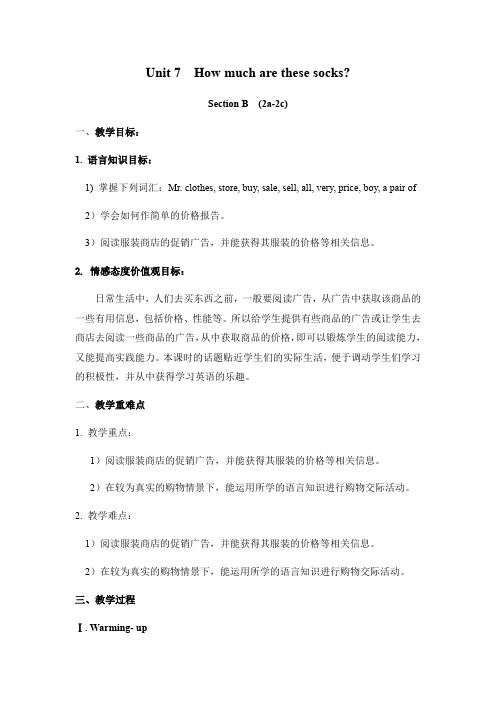
Unit 7 How much are these socks?Section B (2a-2c)一、教学目标:1. 语言知识目标:1) 掌握下列词汇:Mr. clothes, store, buy, sale, sell, all, very, price, boy, a pair of 2)学会如何作简单的价格报告。
3)阅读服装商店的促销广告,并能获得其服装的价格等相关信息。
2. 情感态度价值观目标:日常生活中,人们去买东西之前,一般要阅读广告,从广告中获取该商品的一些有用信息,包括价格、性能等。
所以给学生提供有些商品的广告或让学生去商店去阅读一些商品的广告,从中获取商品的价格,即可以锻炼学生的阅读能力,又能提高实践能力。
本课时的话题贴近学生们的实际生活,便于调动学生们学习的积极性,并从中获得学习英语的乐趣。
二、教学重难点1. 教学重点:1)阅读服装商店的促销广告,并能获得其服装的价格等相关信息。
2)在较为真实的购物情景下,能运用所学的语言知识进行购物交际活动。
2. 教学难点:1)阅读服装商店的促销广告,并能获得其服装的价格等相关信息。
2)在较为真实的购物情景下,能运用所学的语言知识进行购物交际活动。
三、教学过程Ⅰ. Warming- up1.Greet the Ss.2.First let students watch a video together . It’s a rap . If you are good at singing ,you can sing along with it.Then ask students questions:T:Do you want to go shopping in Lily’s clothes store?S:...T:Why do you want to go shopping in the store?S:...T: Do you like to go shopping?S:...T:Let’s go shopping together. Teacher show Ss a picture about one clothes store.Ask students a question:T:what’s the name of the shore?Ss:It’s Mr. Cool’s Clothes Store .Play a radio of Mr. Cool’s Clothes Store. Tell Ss the shore at great sale.Let’s learn an article about Mr. Cool’s Clothes Store.Ⅱ. Reading1.Let’s Ss reading it quickly and answer the question.What kind of article is it?It’s a/an ________A. school notice(公告)B. letterC. advertisement (广告)2.Mr. Cool’s Clothes Store sells many clothes.Let’s Ss listen to the article and underline the clothes in Mr. Cool’s Clothes Store.After listening,ask students a question.T: What clothes does Mr. Cool’s Clothes Store sell?Ss:sweaters, trousers,shorts, skirts, jackets, black shoes, socks.3. Mr. Cool's Clothes Store has a great sale. They sell their clothes at a very good price. If you want to buy these clothes ,we should know the prices.How much are they? Let Ss read the ad again and circle the prices of the clothes.Choose Ss to check the answer.T: How much is the green sweater?Ss:It’s 15 dollars....Ⅲ.Pair Work1.Imagine you work at Mr. Cool's Clothes Store.Read the conversation first and complete the conversation.2. Ss read the conversation and the Mr. Cool's ad and fill in the blanks. Check the answers.3. Practice the conversation for two minutes.4. Let some pairs role-play the conversation.You: Hello,______ I help you?Girl: Yes, please. I need a_____.You: How about these purple______ ?Girl: Oh, I like this one. How_____ is it?You: It’s only ________dollars.Girl: Oh, good. I’ll ______ it.You: And what do you need?Girl: Well, I need a pair of black _____ for school.You: What about this pair? They’re ____twenty-eight _____.Girl: Great. And do you have shorts, too?You: Yes, our shorts are only ________ dollars.Girl: OK. I’ll take the _____ and the _____.Ⅳ. Group work1.After learning the ad of Mr. Cool's Clothes Store,compare the two ads ,which one is better?Ss.The second one.T:Why?Ss:...W hat makes the second one is better? Let Ss look at the ad to find out the reasons. 2.Analyse the beginning and the ending.Come and buy your clothes at our great sale.We sell all our clothes at a very good price.Come to Mr. Cool's Clothes Store now!3.Show Ss more sentences that can make the ad attractive.Spend more than¥100, and you will be our VIP!Free gift wrap!Special price for students!24-hour service!Lost time is never found again.4.As we all know The Double Eleven Festival is a global shopping festival,many salesmen sell their goods online.The Double Twelve is coming.Today let’s have a live stream online for your store.Work in group of 7. Choose one situation and make an ad for your own store. And then make a live stream online.(7人一组,选一个场景制作广告,然后一起做促销直播活动。
新视野大学英语BOOK2网上测试quiz答案
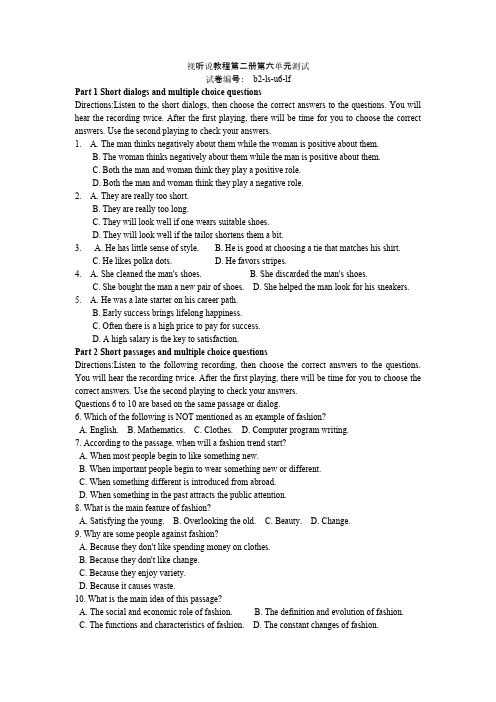
视听说教程第二册第六单元测试试卷编号:b2-ls-u6-lfPart 1 Short dialogs and multiple choice questionsDirections:Listen to the short dialogs, then choose the correct answers to the questions. You will hear the recording twice. After the first playing, there will be time for you to choose the correct answers. Use the second playing to check your answers.1. A. The man thinks negatively about them while the woman is positive about them.B. The woman thinks negatively about them while the man is positive about them.C. Both the man and woman think they play a positive role.D. Both the man and woman think they play a negative role.2. A. They are really too short.B. They are really too long.C. They will look well if one wears suitable shoes.D. They will look well if the tailor shortens them a bit.3. A. He has little sense of style. B. He is good at choosing a tie that matches his shirt.C. He likes polka dots.D. He favors stripes.4. A. She cleaned the man's shoes. B. She discarded the man's shoes.C. She bought the man a new pair of shoes.D. She helped the man look for his sneakers.5. A. He was a late starter on his career path.B. Early success brings lifelong happiness.C. Often there is a high price to pay for success.D. A high salary is the key to satisfaction.Part 2 Short passages and multiple choice questionsDirections:Listen to the following recording, then choose the correct answers to the questions. You will hear the recording twice. After the first playing, there will be time for you to choose the correct answers. Use the second playing to check your answers.Questions 6 to 10 are based on the same passage or dialog.6. Which of the following is NOT mentioned as an example of fashion?A. English.B. Mathematics.C. Clothes.D. Computer program writing.7. According to the passage, when will a fashion trend start?A. When most people begin to like something new.B. When important people begin to wear something new or different.C. When something different is introduced from abroad.D. When something in the past attracts the public attention.8. What is the main feature of fashion?A. Satisfying the young.B. Overlooking the old.C. Beauty.D. Change.9. Why are some people against fashion?A. Because they don't like spending money on clothes.B. Because they don't like change.C. Because they enjoy variety.D. Because it causes waste.10. What is the main idea of this passage?A. The social and economic role of fashion.B. The definition and evolution of fashion.C. The functions and characteristics of fashion.D. The constant changes of fashion.Part 3 Long dialogs and multiple choice questions11. What does the woman suggest?A. Buying the man a suit for work.B. Buying the man a suit for travel.C. Buying herself a suit for work.D. Buying herself a suit for modeling.12. What does the woman think about the suit the man is wearing?A. It looks handsome.B. It looks outdated.C. It should be cleaned.D. It should be ironed.13. Why doesn't the man like the jacket the woman recommends?A. Because it is single-breasted (单排扣的).B. Because it is double-breasted (双排扣的).C. Because it is brown.D. Because it looks out of style.14. What kind of trousers does the man dislike?A. Dark blue trousers.B. Short trousers.C. Black trousers.D. Brown trousers.15. What does the woman think about the black trousers?A. They are too long.B. They are too short.C. They can be shortened if they are too long.D. They should be longer.Part 5 Short dialogs and blank fillingDirections:Listen to the following recording, then fill in the blanks with the missing words. You will hear the recording twice. After the first playing, there will be time to write the missing words. Use the second playing to check your answers.Chris: Tina? What are you wearing?Tina: I'm 26. an outfit for a job interview. What do you think?Chris: You're wearing 27. ! I've never seen you 28. and a blouse before!Tina: I know. These nylons are really itchy. Maybe I should wear 29. , instead.Chris: You'll be too hot. Maybe you should wear a long skirt or 30. . You'd lookgood in 31. , too!Tina: I can't wear a miniskirt 32. !Chris: You'd 33. in a miniskirt than you would in that 34. !Tina: You're such 35. !Part 1 1. D 2. C 3. A 4. B 5. CPart 2 1.A 2. B 3. D 4. D 5. CPart 3 1. A 2. C 3. B 4. D 5. CPart 5 1.trying on 2. a business suit 3. in a skirt 4. cotton tights 5. a dress6. a miniskirt7. to an office8. catch more eyes9. suit 10.a typical boy听说第二册第七单元测试试卷编号:b2-ls-u7-hjwPart 1 Short dialogs and multiple choice questionsDirections:Listen to the short dialogs, then choose the correct answers to the questions. You will hear the recording twice. After the first playing, there will be time for you to choose the correct answers. Use the second playing to check your answers.1. A. They are worthless people. B. They are not liking to spend money.C. They make too much money.D. They spend too much money.2. A. She is going to travel. B. She is going to blow it all immediately.C. She is going to save it for future use.D. She is going to invest it in a project.3. A. They depend mainly on bookstores to get rich.B. They depend mainly on cheating.C. They know the secret to getting rich.D. They may not really know how to make a fortune.4. A. To spend it at Christmas. B. To pay the tuition.C. To buy books.D. To pay for the accommodations.5. A. The interest rates have been low. B. The interest rates would rise soon.C. Her old computer did not work well.D. The new computer was on sale.6. A. When he borrows money from a friend. B. When he receives his salary.C. Not until half a year later.D. Not until a year later.7. A. More than 30 pounds. B. Exactly 30 pounds.C. Less than 30 pounds.D. Less than 13 pounds.8. A. Put all her money in the bank. B. Put her money in his hands.C. Write down her decision to save.D. Make a budget.9. A. She will try her luck with a lottery ticket.B. She is sure she is going to win.C. She wants to share the money she wins with the man.D. She wants to buy the ticket by herself.10. A. She would try to become a famous star.B. She would spend all of it on travel.C. She would save all of it in a bank.D. She would consider both saving and enjoyment.Part 2 Short passages and multiple choice questionsDirections:Listen to the following recording, then choose the correct answers to the questions. You will hear the recording twice. After the first playing, there will be time for you to choose the correct answers. Use the second playing to check your answers.Questions 11 to 15 are based on the same passage or dialog.11. How much did the hotel charge them initially?A. $13.B. $27.C. $29.D. $30.12. How much did the hotel overcharged them?A. $1.B. $2.C. $5.D. $9.13. How did the bellboy ((旅馆的)男侍者) expect the guests to react after he pocketed $2?A. The guests would be angry.B. The guests would be happy enough to get a refund.C. The guests would be slightly disappointed.D. None of the above.14. Which of the following calculations did the bellboy use to find that $1 was missing?A. 30 - (27 + 2)B. 29 - (27 + 1)C. 5 - 3 - 1D. 9 - 5 - 315. Which of the following calculations should the bellboy use to solve his puzzle?A. 27 + 2 + 1 = 30B. 30 - 5 = 27 - 2C. 29 + 1 = 30D. 30 - 1 = 29Part 3 Long dialogs and multiple choice questionsDirections:Listen to the following recording, then choose the correct answers to the questions. You will hear the recording twice. After the first playing, there will be time for you to choose the correct answers. Use the second playing to check your answers.Questions 16 to 20 are based on the same passage or dialog.16. What is Robert doing?A. He is buying a lottery ticket.B. He is looking at his lottery ticket.C. He is looking at Jane's lottery ticket.D. He is asking Jane to look at the wining lottery ticket.17. Why doesn't Jane know the final result?A. They won't announce the result until tomorrow.B. They haven't drawn the winning numbers yet.C. The horse race has not started yet.D. The horse race has not finished yet.18. Why does Jane feel lucky with that particular ticket?A. It does not include an unlucky number like 13.B. It does not include an odd number like 7.C. It has her complete birth date in it.D. It has her birthday in it.19. What does Robert think about a Ferrari car?A. It can be very expensive.B. It runs fast.C. It looks beautiful.D. It is a safe car.20. What does Jane think about the car?A. It is cheap and of bad quality.B. It is inexpensive and of good quality.C. It is expensive and will cost her all the money.D. It is expensive but she can still save some money.Part 4 Short dialogs and blank fillingDirections:Listen to the following recording, then fill in the blanks with the missing words. You will hear the recording twice. After the first playing, there will be time to write the missing words. Use the second playing to check your answers.Questions 21 to 30 are based on the same passage or dialog.Thomas: Bill, can you 21. ?Bill: 22. ?Thomas: I can't 23. my family with my pay. They 24. too much.Bill:I'm sorry,Thomas,I'm 25. . But Brown is a banker. If you 26. , he might be glad to help you.Thomas: I'll 27. trying to borrow money from that miser.Bill: But Mrs. Brown is 28. and ready to help. And she is the 29. of a big company. Thomas: OK, I'll try 30. with her.Part 1 1.B 2. C 3. D 4. A 5. C 6. B 7. A 8. D 9. A 10. DPart 2 1. D 2. C 3.B 4. A 5. BPart 3 1.C 2. B 3. D 4. A 5. DPart 4 1. give me a loan 2. What for 3. support 4. are spending 5. hard up myself6. let him know7. get nowhere8. easy-going9. general manager 10. my luck新视野视听说第二册第八单元测试试卷编号:B2-LS-U8-LCPart 1 Short dialogs and multiple choice questions(Each item: 1)Directions:Listen to the short dialogs, then choose the correct answers to the questions. You will hear the recording twice. After the first playing, there will be time for you to choose the correct answers. Use the second playing to check your answers.1. A. Warning the woman against walking at night. B. Offering to walk back with the woman.C. Saying goodbye to the woman.D. Telling the woman to be on guard.2. A. He stole a mobile phone. B. He lost his purse.C. He had his mobile phone stolen.D. He is an annoying man.3. A. She hopes to get back her laptop (笔记本电脑). B. She hopes to catch the thief.C. She hopes Steve will get over his rage.D. She hopes Steve will get some compensation.4. A. None. B. One. C. Two D. Three.5. A. Her bike was locked by the police. B. Her bike was damaged.C. Her bike and lock were stolen.D. Her bike pump was stolen.Part 2 Short dialogs and blank filling(Each item: 1)Directions:Listen to the following recording, then fill in the blanks with the missing words. You will hear the recording twice. After the first playing, there will be time to write the missing words. Use the second playing to check your answers.Questions 6 to 18 are based on the same passage or dialog.W: What do you think about your life here 6.____________ ?M: Well, it's not too bad. I spend 7._______________ my time in an 8x10 cell(囚室), and you spend most of your time in a 6x8 8.___________________ .W: That's a funny way of looking at 9. _______________________.M: Here I get 10. _________________ a day. There in the office you 11.________________ for one meal and you have to pay for it.W: You're getting more interesting.M: In prison I can watch TV and 12.___________________ . At work you 13. _______________ for watching TV and playing games.W: Go on. I'm 14. _______________.M: Here in prison they 15. ________________ my family and friends to visit. In the office you can't even speak to your family and friends 16.__________________ . Now would you like to 17. _____________ with me?W: 18. ____________________- what you've said, I'm afraid I wouldn't.Part 3 Short passages and multiple choice questionsDirections:Listen to the following recording, then choose the correct answers to the questions. You will hear the recording twice. After the first playing, there will be time for you to choose the correct answers. Use the second playing to check your answers.Questions 19 to 23 are based on the same passage or dialog.19. What was Clive doing?A. He was going out.B. He was coming home.C. He was presenting a report at a meeting.D. He was sleeping.20. What did the police officer see at the crime scene?A. A young businessman lay in a pool of blood.B. Clive's key was in the lock of the door.C. Clive was dead.D. All of the above.21. What did the taxi driver NOT say?A. He was just one block away from the scene.B. He heard a loud noise.C. He had the car window down.D. He saw a parcel delivery truck nearby.22. What did the delivery man say?A. He guessed someone must have waited outside for Clive to come out.B. He guessed someone must have followed Clive home.C. He heard something like a car backfiring.D. He saw the taxi driving fast away from the crime scene.23. What strange thing did the delivery man say that caused the officer's suspicion?A. He played the radio loud.B. He did not hear anything.C. He knew Clive was coming back home early in the morning.D. He knew Clive was going to work early in the morning.Part 4 Short passages and True/False questions(Each item: 1)Directions:Listen to the following recording, then mark the statements T (true) or F (false). You will hear the recording twice. After the first playing, there will be time for you to write the correct answers. Use the second playing to check your answers.Questions 24 to 28 are based on the same passage or dialog.24. The trial is concerned with a burglar case. T F25. The judge announced the verdict (判决) himself. T F26. The verdict found the defendant (被告) innocent. T F27. The relatives of the defendant were delighted. T F28. The defendant was innocent in reality. T FPart 5 Long dialogs and multiple choice questionsDirections:Listen to the following recording, then choose the correct answers to the questions. You will hear the recording twice. After the first playing, there will be time for you to choose the correct answers. Use the second playing to check your answers.Questions 29 to 33 are based on the same passage or dialog.29. What is the dialog mainly about?A. The man tells the woman about the mugging he experienced.B. The woman tells the man about the mugging she experienced.C. The woman tells the man about the mugging her friend experienced.D. The woman advises the man not to commit mugging.30. What did the woman lose in the mugging?A. Her trust in men and week's pay.B. MasterCard, Visa card and sixty-six dollars.C. Her ID, Visa card and sixty dollars.D. Her sense of humor and fear of the dark.31. When was the woman robbed?A. Just before dawn in a dark alley.B. At sunset on the sunny side of the street.C. In broad daylight in a parking lot.D. In the park during the day.32. What can we learn from the woman's description of the mugger?A. He is about 170cms tall and unusually fat.B. He is a teenager with pale-blue eyes.C. He is a tall, strong young man.D. He is short, with brown eyes.33. What does Jackie hope will happen to the mugger?A. He spends the remaining years of his life in prison.B. He reforms and becomes a useful citizen.C. He apologizes to her next time they meet in the park.D. He locks up his apartment at night.Note: There is NO audio recording for the questions.Part 1 1. B 2. C 3. D 4. A 5. CPart 2 1. in prison 2. the greater part of 3. small office 4. things 5. three meals/3 meals6. get a break7. play games8. get fired9. all ears 10. allow11. on the phone 12. change places 13. In spite ofPart 3 1. B 2. D 3. A 4. B 5. CPart 4 1. B 2. B 3. A 4. A 5. BPart 5 1. B 2. C 3. D 4. D 5. A视听说第二册第九单元测试试卷编号:B2-LS-U9-LCPart 1 Short dialogs and multiple choice questions (Each item: 1)Directions:Listen to the short dialogs, then choose the correct answers to the questions. You will hear the recording twice. After the first playing, there will be time for you to choose the correct answers. Use the second playing to check your answers.1. A. He lost is license. B. He was driving in the wrong direction.C. He knocked down a woman.D. He drove through a green light.2. A. Drivers should follow the new law. B. Drivers should not forget the old rules.C. Drivers will ignore the new law.D. Drivers find the new law has saved a lot of lives.3. A. They both think cyclists do not have to wear helmets.B. They both think cyclists should wear helmets.C. The man suggests wearing helmets while the woman thinks otherwise.D. The woman suggests wearing helmets while the man thinks otherwise.4. A. A taxi driver-a passenger. B. A driver-a friend.C. A new driver-the trainer.D. Mother-son.5. A. They warned people against too much drinking.B. They offered people more drinks than reasonable.C. They welcomed the law that prohibited too much drinking.D. They ignored the law that prohibited too much drinking.Part 2 Short dialogs and blank filling (Each item: 1)Directions:Listen to the following recording, then fill in the blanks with the missing words. You will hear the recording twice. After the first playing, there will be time to write the missing words. Use the second playing to check your answers. Questions 6 to 13 are based on the same passage or dialog.Jane: Peter, you shouldn't have 6.________________ the red light.Peter: Sorry, but I'm tired. I want to get home 7._______________ early.Jane: I told you not to drink so much. Your breath 8.__________________ alcohol. We'll get into trouble if we 9._______________ a policeman. Slow down a bit.Peter: I’m only 10.___________________ 50.[They see a dog in the middle of the road.] Jane: 11._____________________- ! There's a dog ahead!Peter: Oh, no! That damned dog! I almost 12.____________________ .Jane: You almost hit the police car coming 13.______________________ !Part 3 Short passages and multiple choice questions(Each item: 1)Directions:Listen to the following recording, then choose the correct answers to the questions. You will hear the recording twice. After the first playing, there will be time for you to choose the correct answers. Use the second playing to check your answers.Questions 14 to 18 are based on the same passage or dialog.14. What did the police officer find?A. He found a crashed car and a dead body.B. He found a crashed car and two dead bodies.C. He found a crashed car and a monkey in it.D. He found a crashed car with an injured man in it.15. What happened when the officer was looking at the car?A. The injured man called for help.B. The injured woman called for help.C. A monkey jumped out of the car.D. A monkey came out of the woods.16. How did the monkey motion the owners of the car had been drinking?A. He pretended to turn up a can by his mouth.B. He raised a can and poured the water out.C. He drank some water.D. He got some water from a can.17. How did the monkey motion the owners of the car had been smoking?A. He struck a match to light a cigarette.B. He put a cigarette between his lips.C. He put his fingers together and held them to his mouth.D. He pretended to be smelling at something.18. Who was driving the car at the time of the car crash?A. The man.B. The woman.C. The monkey.D. Nobody.Part 4 Short passages and True/False questionsDirections:Listen to the following recording, then mark the statements T (true) or F (false). You will hear the recording twice. After the first playing, there will be time for you to write the correct answers. Use the second playing to check your answers.Questions 19 to 23 are based on the same passage or dialog.19. Present at the seminar are an engineer, a physician, and a mathematician. T F20. The engineers tries to use a trash can to cover the fire. T F21. The physicist is concerned with precision. T F22. The mathematician is satisfied with an abstract solution. T F23. The story says people of different professions may look at the same problem from different angles. T FPart 5 Long dialogs and multiple choice questionsDirections:Listen to the following recording, then choose the correct answers to the questions. You will hear the recording twice. After the first playing, there will be time for you to choose the correct answers. Use the second playing to check your answers.Questions 24 to 28 are based on the same passage or dialog.24. What happened to the man?A. He had a major accident.B. He had a small accident.C. He drove back home without any problem.D. He won a race.25. What would happen to the driver if he talked on the cell phone while driving?A. He would hit another car.B. He would hit somebody walking across the street.C. He would be accused by the police.D. He would be put into prison.26. What would the police charge the driver with?A. Illegal driving.B. Driving without concentration.C. Drunk driving.D. All of the above.27. What encouraging words does the woman say?A. The driver is not arrested.B. The driver does not get a fine.C. Nobody is hurt.D. Nobody dies.28. According to the dialog, what is the problem with drivers who have cell phones?A. Their phones may beep a lot while there is a green light.B. Their phones may beep a lot while the traffic is crowded.C. They may not be aware of the fact that talking on the cell phone while driving is dangerous.D. They want to talk more on the phone than usual.Note: There is NO audio recording for the questions.Part 1 1. C 2. A 3. C 4. A 5. BPart 2 1.driven through 2.right away 3. smells of 4. run into 5. going 6. Look out 7. hit it 8. the opposite way the opposite wayPart 3 1.B 2. D 3. A 4. C 5. CPart 4 1.B 2. B 3. A 4. A 5. APart 5 1.B 2. C 3. B 4. C 5. C视听说第二册第十单元测试试卷编号:B2-LS-U10-LCPart 1 Short dialogs and multiple choice questions (Each item: 1)Directions:Listen to the short dialogs, then choose the correct answers to the questions. You will hear the recording twice. After the first playing, there will be time for you to choose the correct answers. Use the second playing to check your answers.1. A. It deserves to live. B. It should be killed immediately.C. It is a harmful insect.D. It is a black insect.2. A. He has accepted a promotion. B. He has got a raise.C. He is afraid of flying.D. He is afraid of the woman.3. A. She is concerned with the future rather than the present.B. She is concerned with the present rather than the future.C. She is afraid of the past.D. She is afraid of the future.4. A. She had nightmares almost every day. B. She welcomed her parents' visits.C. She slept with her parents when she was happy.D. She slept with her parents when she was afraid.5. A. She saw a ghost. B. She is writing on a white sheet.C. She was frightened by a big spider.D. She was frightened by a small spider.Part 2 Short dialogs and blank filling (Each item: 1)Directions:Listen to the following recording, then fill in the blanks with the missing words. You will hear the recording twice. After the first playing, there will be time to write the missing words. Use the second playing to check your answers. Questions 6 to 22 are based on the same passage or dialog.Tony: Nancy and Laura, just the 6.____________ I was looking for.Laura: Well, Sherlock Holmes, you've just found us. 7._____________?Tony: The Outdoor Club is going 8._____________ this weekend. 9.__________ join us for an adventure?Nancy: Gee, I'd like to go, Tony, but if 10. __________________, I wouldn't be able to 11._____________ my biology assignment, and it's 12._________________ on Monday. Laura: I could be interested, but will there be 13. ____________________? I hate snakes. They leave me 14.___________________ .Tony: Probably not, Laura, we’ll be 15. _________________, and snakes don't much 16. ________________ the cold. But there are different kinds of snakes. 17._____________ like rattlers (响尾蛇), and friendly ones 18._____________________ garter snakes(乌蛇,乌梢蛇). You can't be afraid of the friendly snakes, 19.____________________-- ?Laura: Well, if we encounter any snakes, friendly 20.________________- , you'll see 21.________________ I can 22. _____________.Part 3 Short passages and multiple choice questions (Each item: 1)Directions:Listen to the following recording, then choose the correct answers to the questions. You will hear the recording twice. After the first playing, there will be time for you to choose the correct answers. Use the second playing to check your answers.Questions 23 to 27 are based on the same passage or dialog.23. Which of the following is true according to the speaker?A. No one loves flying.B. Only birds love flying.C. Not everyone likes to fly.D. Most people know how to deal with fear of flying.24. According to the speaker, if one and his neighbor both fear flying, what can they do to lessen their fears?A. Talk about one's courage in flying.B. Share their fears with each other.C. Break the ice with a firm handshake.D. Walk across the aisle to talk to them25. What is the advantage of bringing an MP3 player with you when flying?A. It can create a small world of your own.B. It can decrease the noise from the engine.C. You can concentrate on the music you like.D. All of the above.26. What does the speaker finally suggest?A. Do something difficult to forget the fear.B. Do something interesting to forget the fear.C. Try to forget the height.D. Try to remember the height.27. Which of the following can be the best title for the passage?A. The Importance of Overcoming Fear of Flying.B. Types of People Who Fear Flying.C. Ways to Lessen Your Fear of Flying.D. The Relationship between Fear and Types of Passengers.Part 4 Short passages and True/False questions (Each item: 1)Directions:Listen to the following recording, then mark the statements T (true) or F (false). You will hear the recording twice. After the first playing, there will be time for you to write the correct answers. Use the second playing to check your answers.Questions 28 to 32 are based on the same passage or dialog.28. To reduce one's fear, one had better avoid drinking alcoholic beverages. T F29. Young children may find a flight experience exciting. T F30. If you observe young children's behavior, you may get more nervous. T F31. Even if you are not afraid of the height, you had better not sit by the window. T F32. Think about the numerous safe flights that take place every day, and you will feel better. T F Part 5 Long dialogs and multiple choice questions (Each item: 1)Directions:Listen to the following recording, then choose the correct answers to the questions. You will hear the recording twice. After the first playing, there will be time for you to choose the correct answers. Use the second playing to check your answers.Questions 33 to 37 are based on the same passage or dialog.33. Where did the woman go?A. She went to see a movie.B. She went to see a concert.C. She went to treat a patient.D. She went to see a psychiatrist.34. Which method did the woman try before?A. Medicine.B. Physical exercise.C. More contact with spiders.D. All of the above.。
Unit7Weletotheunit课件牛津译林版英语七年级上册2

Learning aims
Warming up
There are all kinds of shops bookshop clothes shop
flower shop shoe shop
sports shop supermarket
toy shop gift shop
gift shop bookshop clothes shop supermarket sports shop shoe shop toy shop flower shop
Read and answer
• What present does Daniel buy for his friend at last?
Read and answer
• What present does Daniel buy for his friend at last? • He buys some stamps for him.
Danniel wants to buy a Christmas present for Simon.He is asking Millie for help.Work in pais and talk about what present to buy for your e the conversation below as a model.
• 票。
• 解析: buy 动词,意为“买,购买”。其反义词为sell“卖”
• We can buy all kinds of goods in this shopping mall. 我们可以在这个 大型购物中心买到各种各样的商品。
• 搭配 buy sth. for sb.(=buy sb.sth.)给某人买某物
Key-to-Book-2-Unit-7PPT演示课件

5. You will need to prove that the noise _v_i_o_la_t_e_d_ the
regulations, that your neighbor was causing the noise,
and that you attempted to have him stop.
•7
Word building
4. I don’t appreciate his reply as it was in part a(n) _d_e_n_i_a_l __ of the criticism and in part an attempt to change the issue.
5. O__c_c_as_i_o_n_a_l gunshots can still be heard in the district though no one seems to know who fires the guns and if anyone is hit.
Contents
Section A Women at the management level
Section B A proud homemaker
•1
Contents
Section A
• Words in use • Word building • Banked cloze • Expressions in use • Translation
4. It can be inferred from the passage that the commercial prosperity in Cambridge is due to hi-tech IT companies whose business has been _f_lo_u_r_is_h_i_n_g_.
小学英语单词「人教版」大全
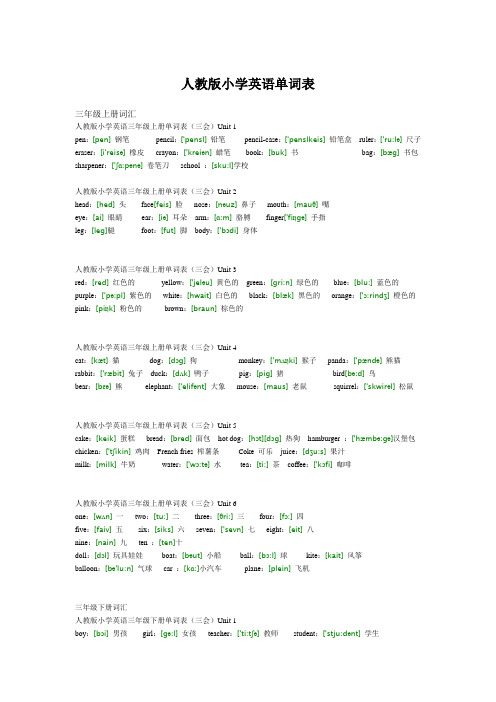
人教版小学英语单词表三年级上册词汇人教版小学英语三年级上册单词表(三会)Unit 1pen:[pen]钢笔pencil:['pensl]铅笔pencil-case:['penslkeis]铅笔盒ruler:['ru:lə]尺子eraser:[i'reisə]橡皮crayon:['kreiən]蜡笔book:[buk]书bag:[bæg]书包sharpener:['ʃɑ:pənə]卷笔刀school :[sku:l]学校人教版小学英语三年级上册单词表(三会)Unit 2head:[hed]头face[feis]脸nose:[nəuz]鼻子mouth:[mauθ]嘴eye:[ai]眼睛ear:[iə]耳朵arm:[ɑ:m]胳膊finger['fiŋgə]手指leg:[leg]腿foot:[fut]脚body:['bɔdi]身体人教版小学英语三年级上册单词表(三会)Unit 3red:[red]红色的yellow:['jeləu]黄色的green:[gri:n]绿色的blue:[blu:]蓝色的purple:['pə:pl]紫色的white:[hwait]白色的black:[blæk]黑色的orange:['ɔ:rindʒ]橙色的pink:[piŋk]粉色的brown:[braun]棕色的人教版小学英语三年级上册单词表(三会)Unit 4cat:[kæt]猫dog:[dɔg]狗monkey:['mʌŋki]猴子panda:['pændə]熊猫rabbit:['ræbit]兔子duck:[dʌk]鸭子pig:[pig]猪bird[bə:d]鸟bear:[bɛə]熊elephant:['elifənt]大象mouse:[maus]老鼠squirrel:['skwirəl]松鼠人教版小学英语三年级上册单词表(三会)Unit 5cake:[keik]蛋糕bread:[bred]面包hot dog:[hɔt][dɔg]热狗hamburger :['hæmbə:gə]汉堡包chicken:['tʃikin]鸡肉French fries 榨薯条Coke 可乐juice:[dʒu:s]果汁milk:[milk]牛奶water:['wɔ:tə]水tea:[ti:]茶coffee:['kɔfi]咖啡人教版小学英语三年级上册单词表(三会)Unit 6one:[wʌn]一two:[tu:]二three:[θri:]三four:[fɔ:]四five:[faiv]五six:[siks]六seven:['sevn]七eight:[eit]八nine:[nain]九ten :[ten]十doll:[dɔl]玩具娃娃boat:[bəut]小船ball:[bɔ:l]球kite:[kait]风筝balloon:[bə'lu:n]气球car :[kɑ:]小汽车plane:[plein]飞机三年级下册词汇人教版小学英语三年级下册单词表(三会)Unit 1boy:[bɔi]男孩girl:[gə:l]女孩teacher:['ti:tʃə]教师student:['stju:dənt]学生this:[ðis]这个my:[mai]我的friend:[frend]朋友I’m=I am 我是nice:[nais]好的愉快的good morning :[gud]['mɔ:niŋ]早上好good afternoon::[gud]['ɑ:ftə'nu:n]下午好meet:[mi:t]遇见;碰见goodbye:[,gud'bai]再见too :[tu:]也;太人教版小学英语三年级下册单词表(三会)Unit 2father:['fɑ:ðə]爸爸dad:[dæd]爸爸口语mother:['mʌðə]母亲;妈妈mom:[mɔm]妈妈口语man:[mæn]男人woman:['wumən]女人grandmother['grænd,mʌðə]外祖母grandma:['grændmɑ:](口语)(外)祖母grandfather:['grænd,fɑ:ðə](外)祖父grandpa:['grændpɑ:](口语)(外)祖父sister:['sistə]姐妹brother:['brʌðə]兄妹let’s=let us 让我们great:[greit]太好了really:['riəli]真地;确切地and:[ænd]和;并且人教版小学英语三年级下册单词表(三会)Unit 3eleven:[i'levn]十一twelve:[twelv]十二thirteen:['θə:ti:n]十三fourteen:['fɔ:'ti:n]十四fifteen:['fif'ti:n]十五sixteen:['siks'ti:n]十六seventeen:[,sevn'ti:n]十七eighteen:['ei'ti:n]十八nineteen:['nain'ti:n]十九twenty:['twenti]二十how many :[hau]:['meni]多少can:[kæn]能够;可以look at:[luk][æt]看;瞧人教版小学英语三年级下册单词表(三会)Unit 4peach:[pi:tʃ]桃pear:[pɛə]梨orange:['ɔ:rindʒ]橙子watermelon:['wɔ:tə,melən]西瓜apple:['æpl]苹果banana:[bə'nɑ:nə]香蕉strawberry:['strɔ:bəri]草莓grape:[greip]葡萄like:[laik]喜欢some:[sʌm]一些;某些thanks 多谢人教版小学英语三年级下册单词表(三会)Unit 5bus:[bʌs]公共汽车bike:[baik]自行车taxi:['tæksi]出租车jeep:[dʒi:p]吉普车desk:[desk]课桌chair:[tʃɛə]椅子Walkman 随身听lamp:[læmp]台灯your:[juə]你的;你们的zoo:[zu:]动物园人教版小学英语三年级下册单词表(三会)Unit 6small:[smɔ:l]小的big:[big]大的long:[lɔŋ]长的short:[ʃɔ:t]短的;矮的tall:[tɔ:l]高的giraffe:[dʒi'rɑ:f]长颈鹿deer:[diə]鹿四年级上册词汇人教版小学英语四年级上册单词表(三会)Unit 1window:['windəu]窗户have:[hæv](我们)有board:[bɔ:d]写字板new:[nju:]新的light:[lait]灯,灯管go 去picture:['piktʃə]画,图画where:[hwɛə]在哪里door:[dɔ:]门computer:[kəm'pju:tə]计算机floor:[flɔ:]地板teacher’s desk 讲台classroom:['klɑ:srum]教室wall:[wɔ:l]墙many:['meni]许多的fan:[fæn]扇子,电扇our:['auə]我们的clean:[kli:n]打扫,清洁,擦干净的classmate['klɑ:smeit]同学good idea:[gud][ai'diə]好主意have a look:[hæv][ei][luk]看一看all right :[ɔ:l][rait]好吧,好的seat:[si:t]座位good job:[gud][dʒɔb]干的好ear:[iə]在……的旁边you:[ju:]你what:[hwɔt]什么see:[si:]看in :[in]在……里面me:[mi:]我the:[ðə]这个,这里look at:[luk][æt]看……we:[wi:]我们人教版小学英语四年级上册单词表(三会)Unit 2Chinese book 语文书pencil:['pensl]铅笔English book 英语书twenty-one:['twenti,wʌn]二十一math book:[mæθ][buk]数学书thirty-one:['θə:ti][wʌn]三十一schoolbag:[ˈsku:lˌbæg] 书包forty-one:['fɔ:ti][wʌn]四十一story-book:['stɔ:ri][buk]故事书fifty:['fifti]五十notebook:['nəutbuk]笔记本too many :[tu:]['meni]太多了colour:['kʌlə]颜色fat:[fæt]胖的heavy:['hevi]重的;沉重的may:[mei]可以what’s=what is sure:[ʃuə]当然可以sorry:['sɔri]对不起here you are:[hiə][ju:][ɑ:]给你人教版小学英语四年级上册单词表(三会)Unit 3long hair:[lɔŋ][hɛə]长头发short hair:[ʃɔ:t][hɛə]短头发thin:[θin]瘦的strong:[strɔŋ]健壮的quiet:['kwaiət]安静的friend(s):[frend]朋友(复数)Chinese 中国的like:[laik]喜欢his:[hiz]他的photo:['fəutəu]照片he’s=he ishas (他/她)有name:[neim]名字he:[hi:]他teacher:['ti:tʃə]教师student:['stju:dənt]学生music:['mju:zik]音乐science:['saiəns]科学sports:[spɔ:ts]体育运动computer game:[kəm'pju:tə][geim]电脑游戏painting:['peintiŋ]绘画she’s=she is her 她的you’re=you are she:[ʃi:]她right:[rait]对的;正确的boy :[bɔi]男孩girl:[gə:l]女孩friend:[frend]朋友人教版小学英语四年级上册单词表(三会)Unit 4study:['stʌdi]书房bathroom:['bæθrum]卫生间bedroom:['bedrum]卧室living room:['liviŋ][ru:m]客厅kitchen:['kitʃin]厨房it’s=it is hey:[hei]嘿fish:[fiʃ]鱼isn’t=is nothere 这里home[həum]家room:[ru:m]房间school:[sku:l]学校classroom:['klɑ:srum]教室phone:[fəun]电话bed:[bed]床sofa:['səufə]沙发shelf:[ʃelf]书架fridge:[fridʒ]冰箱table:['teibl]桌子they:[ðei]他们aren’t=are not they’re=they are key:[ki:]钥匙open:['əupən]打开look:[luk]看please:[pli:z]请on 在……上面no 不;不是window:['windəu]窗户desk:[desk]课桌;书桌door:[dɔ:]门chair:[tʃɛə]椅子bed:[bed]床人教版小学英语四年级上册单词表(三会)Unit 5rice:[rais]米饭fish:[fiʃ]鱼noodle(s) :['nu:dl]面条(复数)beef:[bi:f]牛肉vegetable:['vedʒitəbl]蔬菜soup:[su:p]汤have:[hæv]吃dinner:['dinə]晚餐;正餐wait 等I’d like=I would likebread 面包:[bred]milk:[milk]牛奶egg:[eg]蛋water:['wɔ:tə]水hungry:['hʌŋgri]饥饿的for:[fɔ:]为;给thank you:[θæŋk][ju:]谢谢你knife:[naif]刀chopsticks:['tʃɔpstiks]筷子(复数)spoon:[spu:n]勺子plate:[pleit]盘子fork:[fɔ:k]叉子help:[help]帮助;帮忙pass:[pɑ:s]传递ready:['redi]准备好了try :[trai]常识;试一下help yourself:[help][juə'self]随便吃show 展示[ʃəu] yummy:['jʌmi]好吃的food:[fu:d]食物use:[ju:z]使用chicken:['tʃikin]鸡肉人教版小学英语四年级上册单词表(三会)Unit 6family :['fæmili]家庭parents 父母uncle:['ʌŋkl]叔叔;舅舅aunt:[ɑ:nt]姑姑;婶;姨baby:['beibi]婴儿people:['pi:pl]人member:['membə]成员only:['əunli]只有;仅仅puppy:['pʌpi]小狗gee:['dʒi:]用以表示惊奇、赞赏come:[kʌm]来who:[hu:]谁sister:['sistə]姐妹brother:['brʌðə]兄弟father:['fɑ:ðə]父亲;爸爸baseball player:['beis,bɔ:l]['pleiə]棒球运动员driver :['draivə]司机doctor:['dɔktə]医生farmer:['fɑ:mə]农民nurse:[nə:s]护士look:[luk]看上去;看;瞧young:[jʌŋ]年轻的四年级下册词汇人教版小学英语四年级下册单词表(三会)Unit 1computer:[kəm'pju:tə]计算机board:[bɔ:d]写字板fan:[fæn]风扇light:[lait]灯this:[ðis]这;这个is:[iz]是my:[mai]我的that:[ðæt]那;那个your:[juə]你的teacher’s desk 讲台picture:['piktʃə]图画;照片wall 墙壁floor:[flɔ:]地板yes:[jes]是;是的it :[it]它This is my computer.这是我的电脑That ia your computer. 这是你的电脑Ls this a teacher’s desk? Yes,it is. 这是讲台桌吗。
- 1、下载文档前请自行甄别文档内容的完整性,平台不提供额外的编辑、内容补充、找答案等附加服务。
- 2、"仅部分预览"的文档,不可在线预览部分如存在完整性等问题,可反馈申请退款(可完整预览的文档不适用该条件!)。
- 3、如文档侵犯您的权益,请联系客服反馈,我们会尽快为您处理(人工客服工作时间:9:00-18:30)。
云南师范大学外语学院大学外语部
New Horizon College English
The Teaching Plan for Unit 7, Book 2 (Listening and Speaking)
Relax or Die
Students’ level:Band 2
Teaching material: Unit 7: Relax or Die
Teaching aims:
1.Review the newly learned expressions and patterns;
2.Get familiar with listening;
3.Practice conventional skills on congratulations and invitation;
Teaching time: 2 periods
Teaching method:Communicative Language Teaching Approach
Exercises from the textbook
Warming-up: P98; Understanding short conversation: P99; Understanding a long conversation: P100; Understanding a passage: P101; Understanding a movie dialog: P102; Speaking: P103-107; Listening and Speaking: P108; Homework: P109-111; Oral Report: P112
Teaching stages:
The whole teaching follows the exercises in the book. Specifically speaking,
1. Listening to the warming-up, with emphasis on people’s different views about
time;
2. Listening to the understanding a long conversation, with focus on the newly
learned phrases and sentence patterns;
3. Listening to the understanding a passage, with stress on understanding the
general idea of passages, getting the details and, retelling the passage; of course, concerning the content of the passage, the teacher can supplement some background knowledge;
4. Listening and practicing conversational skills on expressing maximum and minimum;
comparison and contrast with the aim to master the basic but useful expressions;
5. Listening, taking notes and retelling listening, listening to a passage, then, taking
some notes to fill in the blankets of the missing words; answering some questions concerning the passage then retelling the story in students’own words with the aim to integrate listening, speaking and understanding to facilitate students’ learning;
Topic: 1) How to lighten your load and save your life?
2) Do you have your own ways to save your life?
3) What is your wonderful life?。
